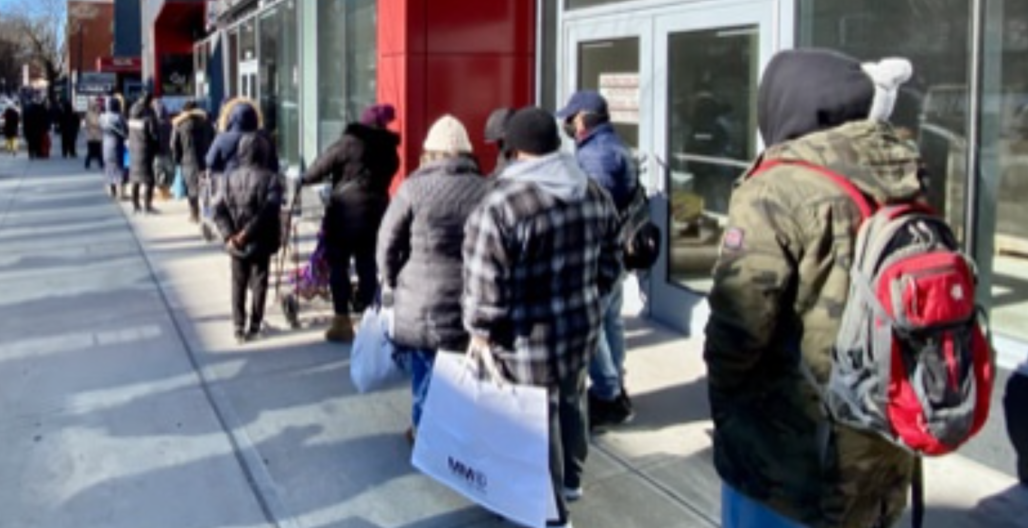AAFE and Urban Resource Institute (URI) are preparing to open a Families with Children transitional housing center at 39-03 College Point Boulevard in Flushing. In the following article, we cover the critical need for this facility in our community.
Every day at AAFE we are contacted by our neighbors in Flushing who are in desperate need of help. They are mothers and fathers and children at risk of eviction, unable to afford food and medical care and often ineligible for government aid. They are frequently just a paycheck away from losing their home.
They are the reason we felt so strongly about opening a Families with Children Center in Flushing. While it can be uncomfortable to face the reality of poverty and housing instability in our community, looking the other way is not a solution and will not make the problem go away. During the pandemic, lines wrapped around the block for our clothing and food giveaways in Flushing, with at least 225 families receiving assistance each month. Other social service organizations working in Flushing experienced similar demand for their food pantries and other mutual aid programs.
–Even before Covid, 41% of households in Community District 7 (CD7) were severely rent burdened, up 10% in the past decade.
–25% of families were living in overcrowded homes.
–Nearly 22,000 Asian individuals in CD7 were living in households with annual incomes below the federal poverty line.
–Following Hurricane Ida, 10 of 11 New York City basement-flooding deaths were Asian American.
While most people might not be aware of it, many local Asian-serving nonprofit organizations have active waitlists for families in need of transitional housing.
These facts are all flashing red warning signs – predictors of growing homelessness. At AAFE we seek out every possible opportunity to build affordable housing. We and our partners at One Flushing opened the largest 100% affordable development Flushing has seen in decades. 85,000 applications were received for 231 apartments.
When families don’t luck out in a housing lottery, they often find themselves in circumstances that qualify them for transitional housing. Families facing housing instability are not always street homeless. The facility we plan to build will create a pathway to permanent affordable housing for some of our most vulnerable community members – moms and dads, newborns, toddlers and school aged children who find themselves doubled and tripled up with extended family, in illegal basement apartments or hotels.
At least 10 Asian women with children who are domestic violence survivors could be placed in this transitional housing building today, and move quickly into permanent housing with priority emergency housing vouchers.
Asian immigrant women are at higher risk of housing insecurity and homelessness because they are in lower-wage jobs in domestic work, home health care, retail, hospitality, and food and personal service. These jobs have been impacted more adversely and are slower to come back since the COVID pandemic.
Amongst us, too, are Asian seniors, living in overcrowded housing as caretakers of grandchildren, with family and unrelated roommates – and in housing in poor conditions without heat, private kitchens or bathrooms, and illegally converted. Flushing has received the second highest number of 311 complaints of illegal conversions – basements, single family homes operated as hotels, and rooms subdivided for bed rentals – with over 8,000 calls since 2010 out of 63 zip codes in the city.
We thoroughly examined the feasibility of building conventional affordable housing at 39-03 College Point Boulevard, but due to the limitations of the lot, lack of adequate financing and the long development period that would have been required, it was not an option. Our community has an urgent need for help now. This is why our plan is not only a compassionate solution to the housing crisis gripping our neighborhood but it utilizes a proven model for stabilizing families and communities in the long-term. Credible studies have shown that facilities like the Flushing Families with Children Center have no impact on property values. In fact, they often have the opposite impact. This is a community development project that will make Flushing stronger.
We agree wholeheartedly in robust community engagement for this project. We are committed to ensuring that the community has ample opportunity to hear not only from AAFE, but also from city officials and our partners at the Urban Resource Institute (URI). We look forward to sharing more details with the public and responding to community feedback in the weeks ahead.

